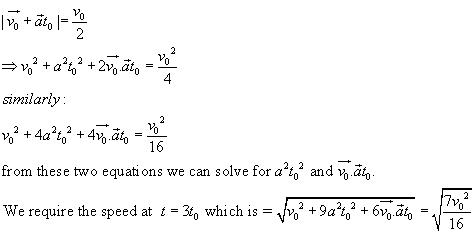that answer is incorrect rohan
A particle is moving with a velocity \overrightarrow{\mathbf{v}_0} when starting at t=0, a constant force starts to act on it. As a result, at t=t0, its speed becomes \dfrac{v_0}{2}, and at t=2t0, its speed becomes \dfrac{v_0}{4}. Determine the speed at t=3t0.
-
UP 0 DOWN 0 0 8

8 Answers
noone
·2009-04-29 20:08:39
t0 = v0/2 ;;; acc for first time interval = -v0/2t
t1= 2t0 = v0/4 ;;; acc for second time interval = -v0/4t
....
acc for third time interval = -v0/8t
so,
v02/16 - v2 = 2 (-v0/8t)[v0t/4 - 1/2.(-v0/8t )t2]
=> v2 = √7v0/64
oho... where am i wrong [12]
